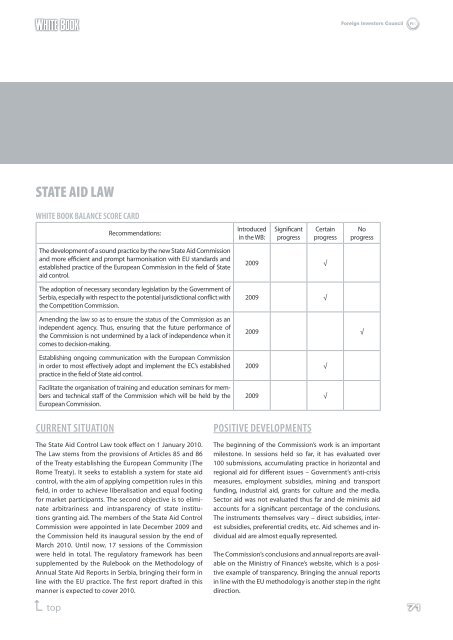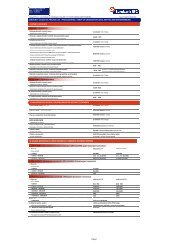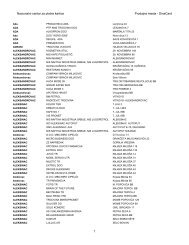Fic rEcommEndationS - Eurobank EFG
Fic rEcommEndationS - Eurobank EFG
Fic rEcommEndationS - Eurobank EFG
You also want an ePaper? Increase the reach of your titles
YUMPU automatically turns print PDFs into web optimized ePapers that Google loves.
STATE AID LAw<br />
WHitE BooK BaLancE ScorE card<br />
cUrrEnt SitUation<br />
The State Aid Control Law took effect on 1 January 2010.<br />
The Law stems from the provisions of Articles 85 and 86<br />
of the Treaty establishing the European Community (The<br />
Rome Treaty). It seeks to establish a system for state aid<br />
control, with the aim of applying competition rules in this<br />
field, in order to achieve liberalisation and equal footing<br />
for market participants. The second objective is to eliminate<br />
arbitrariness and intransparency of state institutions<br />
granting aid. The members of the State Aid Control<br />
Commission were appointed in late December 2009 and<br />
the Commission held its inaugural session by the end of<br />
March 2010. Until now, 17 sessions of the Commission<br />
were held in total. The regulatory framework has been<br />
supplemented by the Rulebook on the Methodology of<br />
Annual State Aid Reports in Serbia, bringing their form in<br />
line with the EU practice. The first report drafted in this<br />
manner is expected to cover 2010.<br />
� top<br />
Recommendations:<br />
The development of a sound practice by the new State Aid Commission<br />
and more efficient and prompt harmonisation with EU standards and<br />
established practice of the European Commission in the field of State<br />
aid control.<br />
The adoption of necessary secondary legislation by the Government of<br />
Serbia, especially with respect to the potential jurisdictional conflict with<br />
the Competition Commission.<br />
Amending the law so as to ensure the status of the Commission as an<br />
independent agency. Thus, ensuring that the future performance of<br />
the Commission is not undermined by a lack of independence when it<br />
comes to decision-making.<br />
Establishing ongoing communication with the European Commission<br />
in order to most effectively adopt and implement the EC’s established<br />
practice in the field of State aid control.<br />
Facilitate the organisation of training and education seminars for members<br />
and technical staff of the Commission which will be held by the<br />
European Commission.<br />
Introduced<br />
in the WB:<br />
Significant<br />
progress<br />
PoSitiVE dEVELoPmEntS<br />
Certain<br />
progress<br />
2009 √<br />
2009 √<br />
No<br />
progress<br />
2009 √<br />
2009 √<br />
2009 √<br />
The beginning of the Commission’s work is an important<br />
milestone. In sessions held so far, it has evaluated over<br />
100 submissions, accumulating practice in horizontal and<br />
regional aid for different issues – Government’s anti-crisis<br />
measures, employment subsidies, mining and transport<br />
funding, industrial aid, grants for culture and the media.<br />
Sector aid was not evaluated thus far and de minimis aid<br />
accounts for a significant percentage of the conclusions.<br />
The instruments themselves vary – direct subsidies, interest<br />
subsidies, preferential credits, etc. Aid schemes and individual<br />
aid are almost equally represented.<br />
The Commission’s conclusions and annual reports are available<br />
on the Ministry of Finance’s website, which is a positive<br />
example of transparency. Bringing the annual reports<br />
in line with the EU methodology is another step in the right<br />
direction.<br />
71




